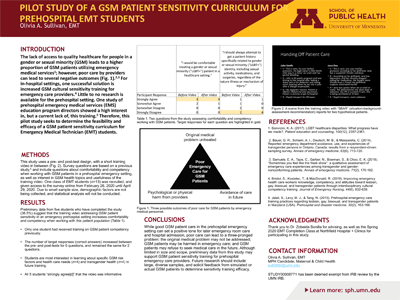Olivia Sullivan
MPH, Maternal & Child Health
Advisor:
Dr. Zobeida Bonilla
Educational Objectives:
- Describe the current state of gender and sexual minority (GSM) patient health in emergency care settings.
- Examine the feasibility of implementing a short training video on GSM patient care for Emergency Medical Technician (EMT) students, and analyze the results.
Keywords:
Gender and sexual minorities, Emergency medicine
Abstract
Many gender and sexual minority (GSM) patients avoid regular medical care due to fear of harm or discrimination, leading to a higher proportion of emergency medical services use. Poor treatment from emergency medical providers can create a three-pronged issue leading to delays in care: failure of the original medical problem to be addressed; increased harm to the patient; and avoidance of medical care in the future. Current research suggests that sensitivity training for in-hospital emergency care providers is beneficial to GSM patients. However, there is no literature available for prehospital emergency settings. A pre-/post-test pilot study was designed to assess potential feasibility and impact of a short training video on knowledge and attitudes of Emergency Medical Technician (EMT) students towards GSM patients in a prehospital emergency setting. The results of this pilot study can provide the basis for more comprehensive research on GSM patient experiences and cultural sensitivity training for emergency care providers in a prehospital setting.

View Poster (PDF)
